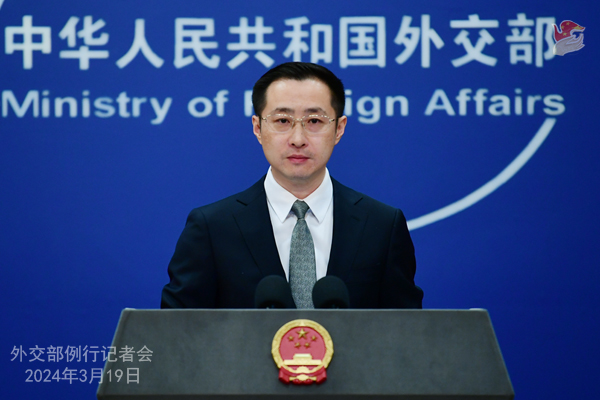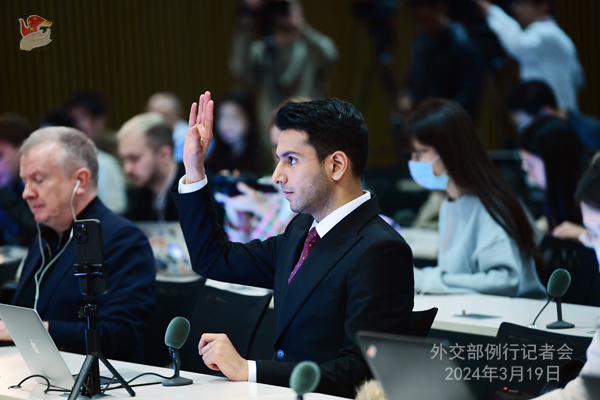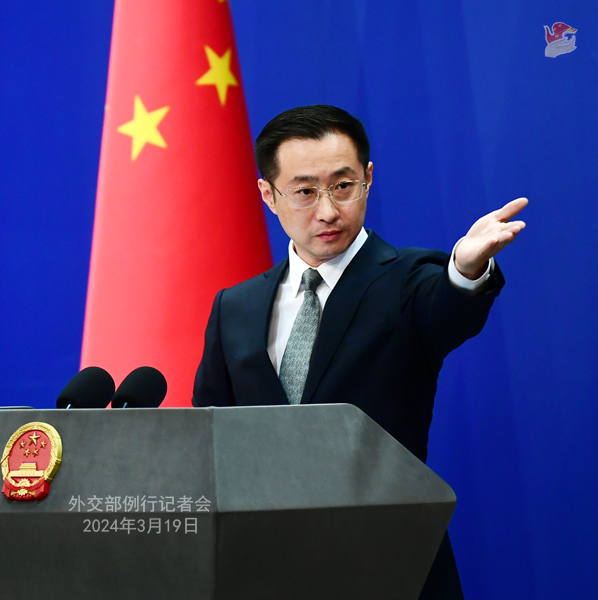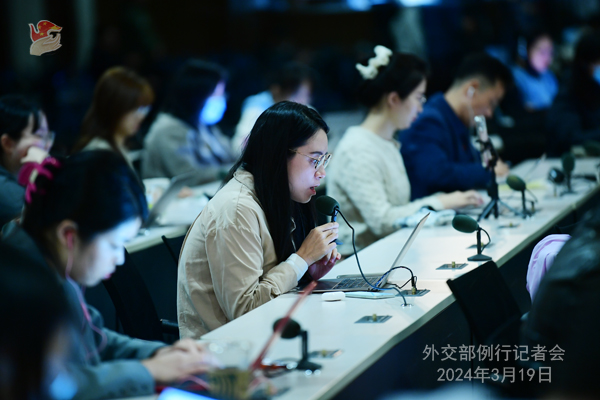Foreign Ministry Spokesperson Lin Jian’s Regular Press Conference on March 19, 2024

China News Service: Foreign Minister Wang Yi paid an official visit to New Zealand yesterday. Do you have more information to share with us?
Lin Jian: On March 18, Member of the Political Bureau of the CPC Central Committee and Foreign Minister Wang Yi visited New Zealand. Prime Minister of New Zealand Christopher Luxon met with Foreign Minister Wang Yi. Wang Yi also held talks with Deputy Prime Minister and Foreign Minister of New Zealand Winston Peters, and met with New Zealand’s Minister for Trade Todd McClay.
Foreign Minister Wang Yi noted that, since China and New Zealand established diplomatic relations, bilateral relations have enjoyed sound momentum of development. Mutual respect, inclusiveness, cooperation, and benefits to the peoples are the valuable lessons from the development of China-New Zealand relations. This year marks the 10th anniversary of President Xi Jinping’s state visit to New Zealand and the establishment of comprehensive strategic partnership between the two countries. China is ready to work with New Zealand to carry forward the pioneering spirit and achieve more “firsts”, so as to keep China-New Zealand relations at the forefront of China’s relations with developed countries. This benefits our two peoples, and will make new contribution to world peace and development. Foreign Minister Wang Yi pointed out that the Chinese economy will continually inject new momentum into the world economy, and will bring new opportunities for New Zealand. China is willing to join hands with New Zealand to actively implement the upgraded version of China-New Zealand Free Trade Agreement, launch consultations and negotiations on the negative list of trade in services at an early date, and take cooperation between the two countries to a new level. China welcomes New Zealand’s continued participation in Belt and Road cooperation. Foreign Minister Wang Yi also noted that both China and New Zealand are participants and contributors of the existing international system and international order. The two countries champion multilateralism, support the core role of the UN in international affairs, and are committed to resolving international disputes with peaceful means. China stands ready to work with New Zealand to enhance solidarity and cooperation, oppose Cold War mentality, unilateralism and protectionism, reject acts of turning back the wheel of history, and uphold the right direction of human progress.
The New Zealand side said that China is an important cooperation partner of New Zealand. The comprehensive strategic partnership between New Zealand and China has provided an important driving force for bilateral cooperation. New Zealand will continue to adhere to the one-China policy, and is willing to further strengthen high-level exchanges with China, deepen cooperation in such areas as economy and trade, education, cultural exchanges, and climate response, and strive for greater development in New Zealand-China relations. The upgraded version of China-New Zealand Free Trade Agreement is of exemplary significance. The two countries should make joint efforts to defend the principle of free trade, and resist all forms of protectionism and unilateral moves. New Zealand welcomes Chinese students and entrepreneurs to study and do business in the country.
The two sides reached broad-based common understandings on practical cooperation across the board, and agreed to hold intergovernmental dialogues in such areas as foreign policy, trade, consular affairs, South Pacific affairs, climate change, and human rights, take more steps to facilitate cross-border travel and maintain active communication on China’s accession to the Digital Economy Partnership Agreement and the Comprehensive and Progressive Agreement for Trans-Pacific Partnership. New Zealand’s Minister for Trade will visit China in April. After Foreign Minister Wang Yi’s visit to New Zealand, the two sides will achieve mutual visit of foreign ministers in this year. The two sides agreed to have more high-level exchanges.
China-Arab TV: The Palestinian-Israeli conflict, now in its 164th day, has killed over 31.7 thousand people and wounded 73.7 thousand others in Palestine. Yesterday Israel launched a military operation at Dar Al-Shifa hospital, the largest medical facility in Gaza, with Palestinian journalists arrested by Israeli forces during their raid. Israeli military claimed that the operation was targeted at Hamas rather than the people in Gaza. However, what we’ve seen is that in each operation it is the people in Gaza who lost their lives. What’s China’s comment?
Lin Jian: It’s been over five months since the Gaza conflict broke out. The humanitarian situation on the ground has become extremely dire. The struggling Dar Al-Shifa Hospital is an epitome of the ongoing humanitarian crisis in Gaza. Currently the top priority is to achieve an immediate ceasefire, do everything possible to protect civilians, avoid more casualties and ease the humanitarian crisis. Relevant members of the international community need to take substantive measures and make a great effort to this end.

Bloomberg: US Secretary of State Antony Blinken criticized China’s provocative actions in the South China Sea and reaffirmed the US security commitment to the Philippines. Does the Foreign Ministry have a comment on Secretary Blinken’s comments in the Philippines?
Lin Jian: The US is not a party to the South China Sea issue and has no right to interfere in the maritime issues between China and the Philippines. The military cooperation between the US and the Philippines should not undermine China’s sovereignty and maritime rights and interests in the South China Sea, nor should it be used to support the illegal claims of the Philippines. China will continue to take necessary steps to firmly safeguard its territorial sovereignty and maritime rights and interests and uphold peace and stability in the South China Sea.
Global Times: According to reports, Yasukuni Shrine announced that Umio Otsuka, former admiral of Japan’s Maritime Self-Defense Force (SDF), will assume the post of the 14th chief priest, the highest-ranking position of the Yasukuni Shrine, on April 1. It’s the first time for a former admiral of the SDF to assume the post. What’s China’s comment?
Lin Jian: The Yasukuni Shrine is a spiritual tool and symbol of Japanese militarists’ war of aggression. It honors 14 convicted Class-A war criminals with grave responsibilities for the war crimes committed during that war of aggression. Not long ago, Japanese defense officials visited the Yasukuni Shrine, and a former admiral will for the first time assume the post of the Yasukuni Shrine’s chief priest. These negative moves once again showed the Japanese side’s erroneous attitude toward the history of aggression. China urges Japan to face up to and reflect on the history of aggression, take concrete measures to make a clean break with militarism and avoid further losing the trust of its Asian neighbors and the international community.
Sputnik: Western media reported that China does not plan to participate in the Ukraine peace conference to be held in Switzerland if Russia is not part of the negotiation process. What’s your comment?
Lin Jian: On the Ukraine issue, China upholds an objective and just position and is committed to promoting talks for peace. China supports the holding in due course of an international peace conference that is recognized by both Russia and Ukraine and ensures the equal participation of all parties and fair discussions on all peace plans.
RIA Novosti: US Ambassador to the United Nations Linda Thomas Greenfield said on Monday that the United States stands ready to engage in bilateral arms control talks with China and Russia without any preconditions. What’s China’s comment on this? And is China ready to join this kind of talks?
Lin Jian: China and the US have channels of dialogue on arms control and nonproliferation. The US should stop its megaphone diplomacy. In terms of advancing the international arms control process, the top priority now is that countries with the largest nuclear arsenals should fulfill their special and primary responsibilities in nuclear disarmament by further reducing the nuclear arsenals significantly and substantially to create conditions for other nuclear-weapon states to join in multilateral nuclear disarmament negotiations. This is also a widely shared consensus in the international community.
AFP: Former Australian Prime Minister Paul Keating said yesterday that he will meet with Chinese Foreign Minister Wang Yi who is visiting Australia. Mr. Keating criticized Australian Foreign Minister Penny Wong’s position on China, saying that she overstated China’s military threats. Is the Foreign Ministry worried that the meeting between former Prime Minister Paul Keating and Foreign Minister Wang Yi will affect the recently thawing China-Australia relations? Do you have more information to share with us on this meeting?
Lin Jian: China will release information on Foreign Minister Wang Yi’s visit to Australia in due course. Please check back for updates.

Bloomberg: The Chinese Foreign Ministry Envoy Wang Kejian met with the Chairman of Hamas Political Bureau Ismail Haniyeh in Qatar. Can you offer any more details about this meeting between the Envoy from the Chinese Foreign Ministry and the Chairman of the Hamas Political Bureau?
Lin Jian: China has released a readout on the meeting which you may refer to.
People’s Daily: The conflict in Gaza is still raging on. The Palestinian President Mahmoud Abbas appointed Mohammad Mustafa as the new Prime Minister. What’s China’s comment?
Lin Jian: China congratulates Mr. Mustafa on taking office as the new Prime Minister of Palestine. Any arrangement concerning the future and destiny of Palestine must follow the principle of “the Palestinians governing Palestine” and fully reflect the Palestinians’ aspirations. We support the Palestinian Authority in enhancing its authority and effectively controlling all of Palestine’s territory, and support all political factions in Palestine in achieving internal reconciliation through consultation and dialogue. China stands ready to work with all parties to deescalate the current tensions and bring the Palestinian question back to the right track of the two-State solution.
Reuters: Taiwan’s vice leader-elect Hsiao Bi-khim arrived in the Czech Republic today and will speak to a think tank there. What’s your comment?
Lin Jian: China strongly opposes official interaction of any form between China’s Taiwan region and countries that have diplomatic relations with China. This position is consistent and clear.
In multiple official documents, including the joint statements and joint communiqué between the government of China and the Czech government, the government of the Czech Republic solemnly committed to stick to the one-China policy, respect China’s sovereignty and territorial integrity and recognize that Taiwan is an inalienable part of the Chinese territory. China urges the Czech Republic to follow its commitment, strictly restrain certain politicians, immediately stop the egregious moves that undermine the national credibility of the Czech Republic and its relations with China. We urge the Czech Republic to take effective measures to undo the negative influence of the incident. Our message to “Taiwan independence” separatists is that whoever engages in “Taiwan independence” will be held accountable by history; whoever in the world creates “one China, one Taiwan” will get burned for playing with fire and taste the bitter fruit of their own doing.
Associated Press of Pakistan: Last week, Prime Minister Sharif met with Chinese Ambassador in Islamabad. In an interview with Xinhua News Agency, he said Pakistan is keen to move to the next phase of China-Pakistan Economic Corridor framework. Do you have any comment on that?
Lin Jian: China commends Prime Minister Shehbaz Sharif’s positive remarks. The China-Pakistan Economic Corridor (CPEC) is an important flagship project of the Belt and Road Initiative. A batch of early harvests of cooperation have been achieved in such areas as ports, transportation infrastructure, energy and industry. Last year, the two sides held a grand celebration event to mark the 10th anniversary of the launch of CPEC. Leaders of the two countries reached new important common understandings on high-quality development of CPEC.
China stands ready to work with Pakistan to follow the guidance of the important common understandings reached by leaders of our two countries, build a growth corridor, a livelihood-enhancing corridor, an innovation corridor, a green corridor and an open corridor, continue to deepen cooperation in various areas, foster new growth points and impetus, and build an upgraded CPEC to deliver greater benefits to the two peoples.
AFP: We learned that Hu Shiyun who taught Chinese literature and language at Kobe Gakuin University in western Japan went missing during his stay in China. Is the Foreign Ministry aware of this? If so, can you share more information with us?
Lin Jian: I’m not aware of that.
